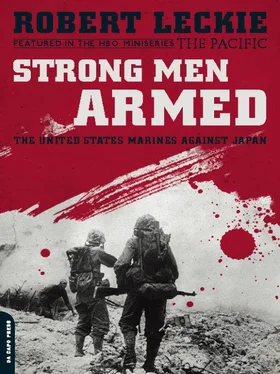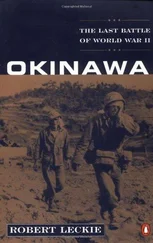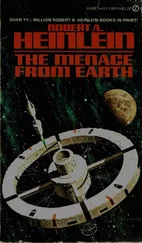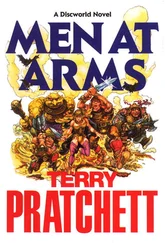Robert Leckie - Strong Men Armed
Здесь есть возможность читать онлайн «Robert Leckie - Strong Men Armed» весь текст электронной книги совершенно бесплатно (целиком полную версию без сокращений). В некоторых случаях можно слушать аудио, скачать через торрент в формате fb2 и присутствует краткое содержание. Город: Cambridge, Год выпуска: 2010, ISBN: 2010, Издательство: Da Capo Press, Жанр: nonf_military, на английском языке. Описание произведения, (предисловие) а так же отзывы посетителей доступны на портале библиотеки ЛибКат.
- Название:Strong Men Armed
- Автор:
- Издательство:Da Capo Press
- Жанр:
- Год:2010
- Город:Cambridge
- ISBN:978-0-786-74832-7
- Рейтинг книги:3 / 5. Голосов: 1
-
Избранное:Добавить в избранное
- Отзывы:
-
Ваша оценка:
- 60
- 1
- 2
- 3
- 4
- 5
Strong Men Armed: краткое содержание, описание и аннотация
Предлагаем к чтению аннотацию, описание, краткое содержание или предисловие (зависит от того, что написал сам автор книги «Strong Men Armed»). Если вы не нашли необходимую информацию о книге — напишите в комментариях, мы постараемся отыскать её.
Strong Men Armed — читать онлайн бесплатно полную книгу (весь текст) целиком
Ниже представлен текст книги, разбитый по страницам. Система сохранения места последней прочитанной страницы, позволяет с удобством читать онлайн бесплатно книгу «Strong Men Armed», без необходимости каждый раз заново искать на чём Вы остановились. Поставьте закладку, и сможете в любой момент перейти на страницу, на которой закончили чтение.
Интервал:
Закладка:
Sabers flashing in the sun.
It ran like a rallying cry all along the Kukum ridges, sweeping east through the coastal gunpits and foxholes, turning right to race up the barbed-wire line of the Tenaru, bursting in the ears of the airfield outposts, among the artillerymen, the amtrack drivers, the tankers, and the engineers grimly bulldozing the airstrip which only the day before had received its first American plane. It had the power to chill hearts, but on Guadalcanal those hearts were swelling with rage. The Marines could not have known that the “surrender flag” was actually a Japanese battle flag accidentally hanging limp and thus obscuring its red center, or that the Goettge mission was conceived in an error compounded by compassion. They only knew that Marines had risked their flesh to help the enemy and had been slaughtered in reward.
All light bantering ceased. Timid patrols turned aggressive and savage. Marines hoped openly for battle, and because they had also not yet known it, talked loudly of wanting the enemy to come because they wanted to kill him and chop him up with his own sabers. There would also come a time when these same men would dread recurrent battle, but now, after the Goettge patrol, they wanted it.
They would get it. It came, at first, down The Slot. Destroyers, sometimes cruisers, sneaked into the bay during darkness to pound the airfield or the men crouching in pits, turning at dawn to streak back to Rabaul. Submarines surfaced between Guadalcanal and Tulagi, firing deck guns to sink every small American ship in sight, chasing Higgins boats back to the anchorage. Sometimes the Marines dueled the enemy warships with their puny 75-millimeter pack howitzers or with the .75 rifles mounted on half-tracks run down to the water. Once the celebrated Gunnery Sergeant Lew Diamond offered to take an 81-millimeter mortar aboard a Higgins boat and go after a submarine which was shelling Guadalcanal with five-inch guns. The offer was declined. But Gunny Lew’s proposal was reflective of the new aggressive spirit which had seized Vandegrift’s Marines after the Goettge patrol, and which kept them on their guns even as the bombs came wailing and crashing down on Henderson Field during increasing aerial bombardment of Guadalcanal.
Lieutenant General Haruyoshi Hyakutate, then assembling his 17th Army at his headquarters in Rabaul, was of one mind with Imperial Headquarters in its conviction that the Americans would tire quickly of war. To this end Admiral Nagumo had sailed to Pearl Harbor. Strike the Americans hard, set them back so far that by the time they had changed from the manufacture of playthings to the making of munitions the resource-rich booty of the Southwest Pacific and Southeast Asia would have been consolidated under the Reign of Radiant Peace. Then, when the Americans attempted to come back, Japan would make it so costly that they would quit the war in a negotiated peace.
Until recently, General Hyakutate’s mission in the over-all scheme of conquest laid down by the militant Premier Hideki Tojo had been to capture Port Moresby in New Guinea, which was just to the north of Australia. But then Port Moresby was given to the 18th Army while Hyakutate’s 17th was told to recapture Guadalcanal. The change annoyed General Hyakutate. Port Moresby seemed by far the more important operation. Nor was the general—a small, thin, testy man—pleased with the army which Imperial Headquarters had given him to do the job at Guadalcanal. As so often happened with the Japanese military, the 17th Army’s 50,000 men had been given to Hyakutate unassembled. The famous 2nd Division——called the Sendai after the city near Tokyo from which most of its men were recruited—was in Java and the Philippines; the 38th Division was in China, along with 17th Army antitank units as far away as Manchuria; the Kawaguchi Brigade, actually close to a division, was in the Palaus; and the Ichiki Detachment was on Guam.
The Ichiki Detachment, which, in the Japanese manner, took the name of its commander, Colonel Kiyono Ichiki, was a reinforced battalion with a strength of about 2,000 men. General Hyakutate decided to use this unit to deal with the annoyance —for such he still regarded it—at Guadalcanal. Though there were but 2,000 Ichikis to hurl against an enemy force his intelligence had estimated at 10,000 men, were these enemy troops not, after all, Americans?
General Hyakutate lost some of his irritation in contemplating a bold stroke that would at once regain Guadalcanal and its vital airfield, would gratify Imperial Headquarters and would also respectfully suggest a measure of his contempt for the new assignment.
Hyakutate ordered Colonel Kiyono Ichiki to move. The Ichikis sailed from Guam to the great naval base at Truk. On August 16, Colonel Ichiki led some 900 storm troops aboard six fast destroyers and shoved off. Behind them came a cruiser and a destroyer escorting two transports carrying the remainder of Ichiki’s troops and his supporting arms.
Ichiki’s destroyers sped swiftly down The Slot, rapidly leaving the slower transports behind. The colonel was in a hurry, for one of the Army’s battle reports on American capabilities said: “It can be seen that when they are pressed for time, the American dispositions and especially their organization of fire are not coordinated. Therefore we must not fail to move fast and attack quickly, giving them no time in which to prepare their positions.”
But the Marines were already prepared and there was aerial reinforcement on its way.
She had been the merchant ship Macmormail, but now she was the Long Island. With her flight deck topside and a few guns she had been turned into a makeshift aircraft carrier, dignified in that status with the name of an American battle, and sent into the Pacific.
On August 20 she reached the southern Solomons and flew off 19 Wildcat fighters and 12 Dauntless dive-bombers to the embattled Marines on Guadalcanal.
The planes came skimming over the coconuts, and the men below glanced up nervously to hear the hum of motors. But then they saw the Yankee star on the wings and they shouted in jubilation. Two of the planes deliberately circled Henderson Field for all to see, and the men ran along the ridgesides and riverbanks and beaches, throwing helmets in the air, punching each other gleefully, cheering and crying for joy.
The first relief had come.
Colonel Kiyono Ichiki was a military man. His carriage was stiff, his jaw square, and his glance struck straight from narrowed eyes. His habit of courage was matched by a habit of thought as clipped and uniform as his military mustache.
He had landed his 900 men on August 18 at Taivu 20 miles to the east of the Tenaru River and he had decided not to wait for the following troops. Nine hundred men such as his—big, strong fellows among the very best troops in the Empire—were surely sufficient to overrun the American defenses and seize the airfield.
Next day, Colonel Ichiki wrote in his diary: “18 Aug. The landing. 20 Aug. The March by night and the battle. 21 Aug. Enjoyment of the fruits of victory.”
True, it was only 19 Aug.—but Colonel Ichiki foresaw the chance that he might die before he could make this entry. So he inscribed the inevitable, postdated it for posterity, and then he sent out a large party to lay communications wire.
Captain Charles Brush was not a military man. His shoulders slumped, his gait was shambling and his sideways glance was of an accusing character calculated to cause respect among the troops, but which actually only confirmed their suspicion that the skipper had quit teaching high school to take a small revenge on the schoolboys who would follow him into service.
On the morning of August 19, leading a patrol of roughly 80 men, Captain Brush shuffled eastward from the Tenaru. Some time after noon, his advance scouts caught sight of the Ichiki wiremen moving slowly westward. Brush attacked.
Читать дальшеИнтервал:
Закладка:
Похожие книги на «Strong Men Armed»
Представляем Вашему вниманию похожие книги на «Strong Men Armed» списком для выбора. Мы отобрали схожую по названию и смыслу литературу в надежде предоставить читателям больше вариантов отыскать новые, интересные, ещё непрочитанные произведения.
Обсуждение, отзывы о книге «Strong Men Armed» и просто собственные мнения читателей. Оставьте ваши комментарии, напишите, что Вы думаете о произведении, его смысле или главных героях. Укажите что конкретно понравилось, а что нет, и почему Вы так считаете.












